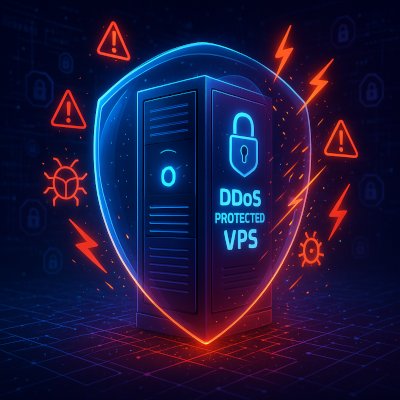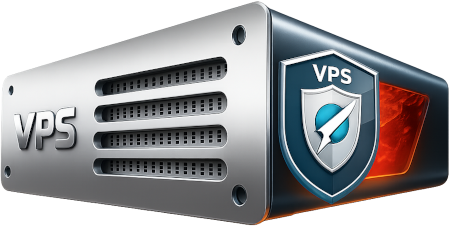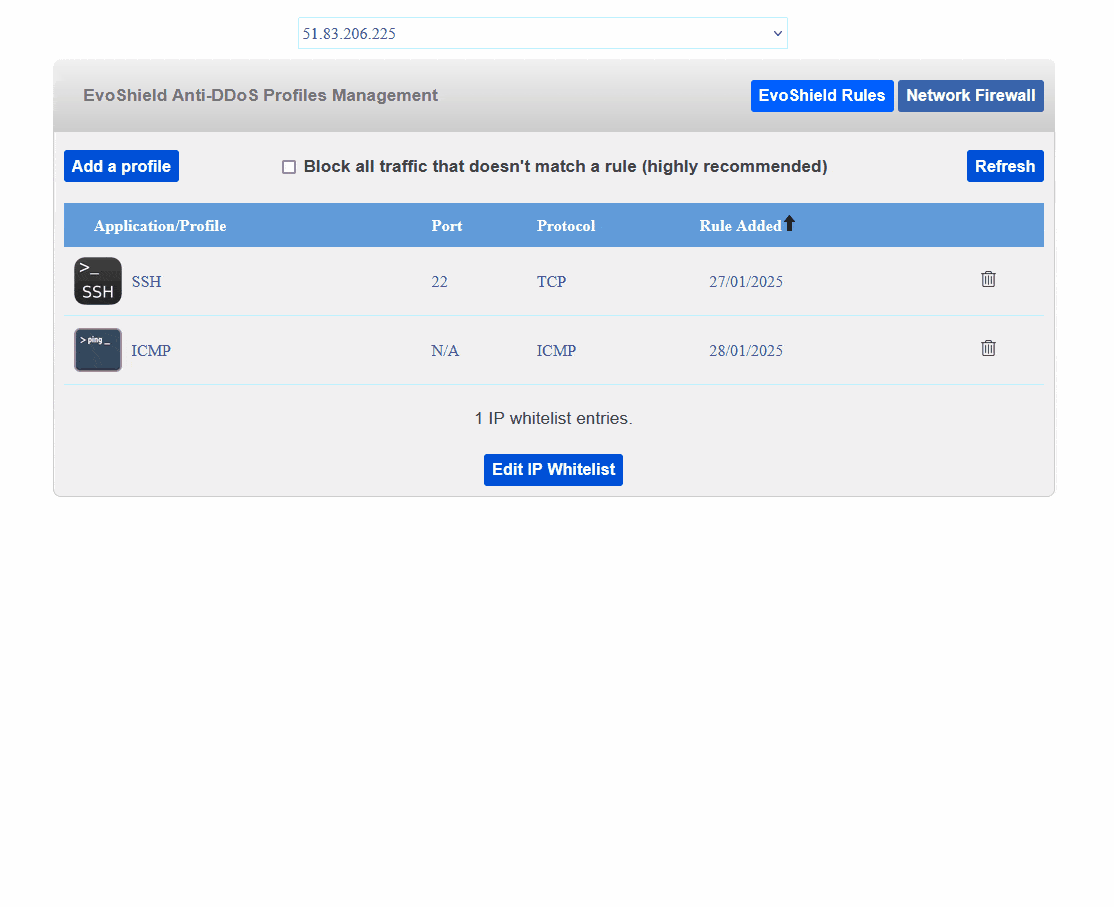
What is a DDoS Protected VPS?
A DDoS Protected VPS is a virtual private server with Anti-DDoS measures built in to keep your services online during Distributed Denial of Service attacks. Instead of letting malicious traffic overwhelm your network, protection systems identify malicious traffic patterns and filter the attack traffic so legitimate users can still connect.
This matters most for latency-sensitive applications - like game servers, APIs, VoIP, and community platforms - where "basic" upstream filtering can either react too slowly or block too aggressively. EvoShield is designed to mitigate attacks while keeping clean traffic flowing without disruption.
How it works
- Detect unusual traffic patterns and application layer attacks.
- Filter malicious packets with adaptive rules & profiles.
- Deliver clean traffic to your VPS so users stay connected.
Ideal for
- Game servers (FiveM, Rust, Minecraft, Hytale)
- Websites & APIs
- VoIP (TeamSpeak) & streaming
- VPNs, proxies & community services
EvoShield protections are continuously updated based on real-world attack patterns and refined over 15+ years of mitigation experience.
The necessity of DDoS Protected Hosting
In today’s digital landscape, DDoS protected hosting is no longer optional for any application that gains even moderate attention. If your app or game server sees any level of success, it’s often not a question of if - but when - it will be targeted by a DDoS attack.
Preparing for that inevitability is critical to your long-term success. A properly protected VPS helps your project handle sudden spikes in attention without being brought down by malicious traffic.
If your VPS is already under attack, you likely understand how damaging downtime can be to your plans, your users, and your reputation. Fortunately, you don’t have to face that threat alone - Evolution Host’s DDoS Protected VPS Hosting is purpose-built to stop attacks before they impact your service.

How EvoShield Outperforms Generic DDoS Protection
When searching for a truly secure DDoS Protected VPS, it’s easy to fall into the trap of providers offering generic, one-size-fits-all solutions. These often rely on basic packet filtering, limited rule sets, or slow-to-react upstream protections. But when you're hosting latency-sensitive services - such as game servers or mission-critical applications - that approach often isn’t enough.
Evolution Host’s DDoS Protected VPS is powered by EvoShield, our proprietary DDoS mitigation platform. Each server benefits from layered, adaptive defenses designed to mitigate both volumetric and application-focused attacks while keeping performance stable.
EvoShield supports custom protection profiles tailored to your use case. Hosting a game server? Apply filters tuned for that title to block malicious traffic while keeping clean traffic flowing. Running VoIP or a VPN? Apply the relevant profile and let EvoShield handle the rest.
These profiles are actively updated based on real-world attack data and refined by a team with 15+ years of mitigation experience. If your application isn’t listed, generic TCP/UDP profiles mitigate the vast majority of attacks.
Whether it's your Gaming VPS or your KVM VPS that needs DDoS protection, we’ve got you covered.

EvoShield DDoS Protection Panel Preview

How EvoShield protects your VPS
A simple workflow: detect abusive traffic, filter it with tuned profiles, and keep clean users connected.
Detect
Traffic is continuously analyzed for attack signatures, protocol abuse, and anomalous behavior.
Filter
Adaptive rules and protection profiles mitigate malicious packets while preserving legitimate traffic.
Deliver clean traffic
Only validated traffic reaches your VPS, helping maintain uptime and stable latency during attacks.
Popular use cases
Understanding modern DDoS attacks
DDoS attacks are no longer just "big traffic floods". Modern attacks combine volume, protocol abuse, and application-level exploitation.
Volumetric attacks
These aim to overwhelm your network with massive amounts of traffic using amplification techniques like UDP reflection, flooding your bandwidth until legitimate users can’t connect.
Examples: UDP floods, NTP amplification, DNS reflectionProtocol attacks
These exploit weaknesses in TCP, UDP, or connection handling to exhaust server resources rather than raw bandwidth.
Examples: SYN floods, connection exhaustion, malformed packet attacksApplication-layer attacks
These target the service itself - game servers, APIs, login systems, or websites - sending traffic that looks legitimate but is designed to cause lag, crashes, or resource spikes.
Examples: game join floods, HTTP floods, query abuseBasic "upstream" DDoS protection often stops only the first category. EvoShield is designed to mitigate all three - which is why it performs better for game servers, APIs, and other latency-sensitive services.

DDoS Protected VPS FAQ
A DDoS Protected VPS is a virtual private server with built-in defenses against Distributed Denial of Service attacks. It helps keep services online by filtering and blocking malicious traffic in real time.
If your VPS runs a public-facing service like a game server, website, or API, it can be targeted. Without protection, attackers can cause downtime or latency spikes. DDoS protection helps maintain stability and uptime under attack conditions.
Leveraging OVH’s network capacity helps absorb large volumes of attack traffic. However, modern attacks often focus on application behavior (for example, game servers or web services). EvoShield adds application-aware filtering and deep inspection to more precisely block malicious traffic patterns while maintaining clean traffic flow.
EvoShield monitors traffic continuously, blocks malicious packets quickly, and supports custom filtering profiles based on the service you’re running - from gaming to VoIP and beyond.
Yes. EvoShield lets you apply custom profiles for services like Minecraft, Rust, TeamSpeak, and more. Profiles are tuned to block common attack patterns targeting those services while keeping performance stable.
A DDoS Protected VPS is hosted by the provider and includes integrated mitigation. Remote DDoS protection routes traffic through filtering endpoints to protect servers hosted elsewhere.
EvoShield is engineered to mitigate attacks without adding latency. Your VPS performance remains fast and stable, including during mitigation events.
DDoS Protected VPS hosting is ideal for game server owners, developers, businesses, and anyone running services that require high availability and resilience against attacks.
Your DDoS Protected VPS can be deployed in minutes. Protection is active immediately, and you can configure profiles for services and game servers as needed.




